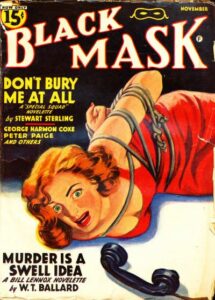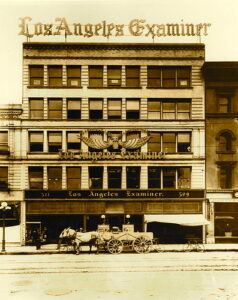by James Scott Bell
@jamesscottbell
 I’m about to begin a series of short stories featuring a Hollywood studio troubleshooter in the 1940s, as part of my Patreon project (see “Escapism Rocks!” from a couple of weeks ago). Technically, this qualifies as historical fiction, and I find something very comforting about the genre, namely: things don’t change!
I’m about to begin a series of short stories featuring a Hollywood studio troubleshooter in the 1940s, as part of my Patreon project (see “Escapism Rocks!” from a couple of weeks ago). Technically, this qualifies as historical fiction, and I find something very comforting about the genre, namely: things don’t change!
With contemporary thrillers, you have to keep up with technology, forensics, communications, law, weapons and so on—knowing there’s always the possibility that some radical innovation that would solve one of your plot problems may occur between the time you finish your manuscript and when it hits a bookstore shelf!
Further, a reference you make to contemporary culture might be turned on its head shortly after your book appears. I recall a thriller from the mid-90s that made favorable references to one O. J. Simpson. The book had been out only a few months when Simpson was arrested for those brutal murders.
With historical fiction, everything like that is frozen. You can concentrate on the story. And best of all, you’re free to choose a period you love. Which is what I did twenty years ago.
Contemporary legal thrillers were hot then, and it seemed like every lawyer and retired judge was writing one. I’d done a couple myself, but wanted to find a market distinction. So I came up with the idea of mixing legal thriller with historical. And I had the perfect setting, too, one virtually unexplored in fiction—turn-of-the-century Los Angeles. (For you youngsters out there, “turn-of-the-century” refers to 1900, not 2000!) L.A. was in transition then, growing up into a major city. It was an exciting time for the practice of law. The man whom many consider the greatest trial lawyer of all time—Earl Rogers—had recently hung his shingle. And women were just beginning to be allowed in the courtroom.
So, I thought, what if we went back to 1903 and a young woman arrives in Los Angeles determined to become a trial lawyer? That became the genesis of a six-book series called The Trials of Kit Shannon.
 I loved doing the research for that series, most of it in the bowels of the downtown Los Angeles library going over microfiche of the Times and the Hearst-owned Examiner. I got so into the research that I began to have dreams I was walking along on the sidewalks of 1903 L.A., passing women in their dresses and hats, hearing the ding of a trolley bell, catching a whiff of the corner cigar stand.
I loved doing the research for that series, most of it in the bowels of the downtown Los Angeles library going over microfiche of the Times and the Hearst-owned Examiner. I got so into the research that I began to have dreams I was walking along on the sidewalks of 1903 L.A., passing women in their dresses and hats, hearing the ding of a trolley bell, catching a whiff of the corner cigar stand.
Another L.A. period I love is 1945 to 1955, the classic decade of film noir. America had won the war and was strutting her stuff, building the most powerful nation on Earth. Babies were booming. But the criminal element, always crawling along the underbelly of society, was also hard at work in areas like vice, bunco, murder, and police and political corruption. What’s not to like?
My folks had a family friend who was one of the steady pulp writers for Black Mask, W. T. Ballard (I profiled him for TKZ here). He had a series character named Bill Lennox, a “Hollywood troubleshooter” who worked for a studio getting stars and other associated folk out of sticky situations—like murder raps.
So I decided to create my own series featuring a Hollywood troubleshooter, written in the classic hardboiled style I love (Chandler, Hammett, etc.) The first story in this series, “Blonde Bombshell,” is set to appear on June 1. These stories are exclusively for my patrons on Patreon. (The details can be found here.)
Here’s a preview:
So…for you historical fiction authors out there, why did you select the particular period of which you write?
For the rest of you, if you were ever to write a historical, what period would you choose, and why?
